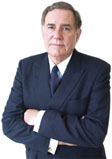

Dear shareholder,
 This is my first letter to you as chairman and a fellow shareholder of Pearson. I have long admired Pearson's brands and content and am honoured to be associated with them.
This is my first letter to you as chairman and a fellow shareholder of Pearson. I have long admired Pearson's brands and content and am honoured to be associated with them.
This is an exciting time for your company. We have reported very strong operating results for 2005. Our education business, the world leader, has increased sales and profits five-fold over the past eight years and shows good future prospects. Penguin and the FT Group are recovering after some tough years and adding to the sense of growing momentum in Pearson as a whole.
Our thanks go to the people in Pearson for this excellent result.
My personal focus over the next few years will be to help build long-term value for Pearson's shareholders. I believe the key to long-term value is growth: growth in customer revenues; growth in earnings; and growth in the returns on the capital you have entrusted to us.
Our current results provide us with a solid base for future growth. But growth is not easy. To succeed, we need to adapt to constantly changing markets.
We have to recognise the pace and nature of change in the media industry. The relentless shift to a digital world has huge implications for how we create, store, protect, package and charge for our content. This shift also brings new sources of competition: free content on the internet; a free-flowing market for secondhand books; easy copying of digital files; and increasingly powerful search engines.
It is comforting to see that Pearson recognised those changes at an early stage and has been investing to ensure we're well placed to benefit from the associated opportunities. In education, for example, we are shifting from a textbook company to a multimedia student and instructor services resource, providing online homework, assessment and tutoring to complement our more traditional content. That strategy has delivered consistently excellent results. The future for customised materials that enable students to work at their own pace, in their own way, looks promising.
The good news is that Pearson is facing change from a position of strength, with the best brands, the best content and the best people in our industries.
Pearson is constantly thinking about the future of its businesses. The board has a well-established process of reviewing the strategy and plans of the whole company and of each of its constituent parts.
In recent years, though the pace of portfolio change may have slowed from the radical reshaping that took place between 1997 and 2000, Pearson has continued to change shape. We have sold our stakes in Recoletos and MarketWatch, and steadily invested in smaller acquisitions which are performing well and creating value. The clear strategy is to reallocate scarce capital resources towards the best opportunities for growth in earnings and returns. We expect that process to continue.
Your board will also experience its fair share of change this year.
Dennis Stevenson has stepped down after 19 years as a director and eight years as chairman. He played a critical role in Pearson's development, combining the courage to support our reshaping with the determination to steady it through some of its toughest years. He will take as much pleasure as any of us in seeing the promise of Pearson now coming through, and I know that shareholders will want to join me in thanking Dennis for his enormous contribution throughout the years.
As Dennis announced at last year's annual meeting, two non-executive directors, with more than 30 years of service between them, are also stepping down this year. Reuben Mark and Vernon Sankey have brought deep business experience, wise counsel and international perspectives to our board, and have chaired our personnel and audit committees with distinction. We thank them for the part they have played in the company for so long.
In their place, we are proposing to add two excellent independent non-executive directors to the board. Sir David Arculus was chairman of O2 until it was acquired by Telefonica earlier this year and has led several media companies including IPC Group, United Business Media and EMAP. Ken Hydon, a non-executive director of Tesco and Reckitt Benckiser, is the former finance director of Vodafone. They bring tremendous experience of the media and technology industries and will add much to the board's work on strategy and governance.
I am very much looking forward to meeting many of you at our annual meeting later this year. I hope it will be the first of many where we can all celebrate excellent operating performance and a sustained increase in shareholder value.

Glen Moreno, Chairman